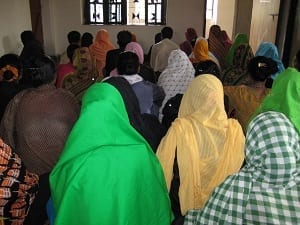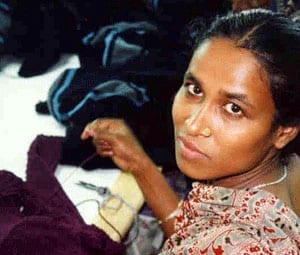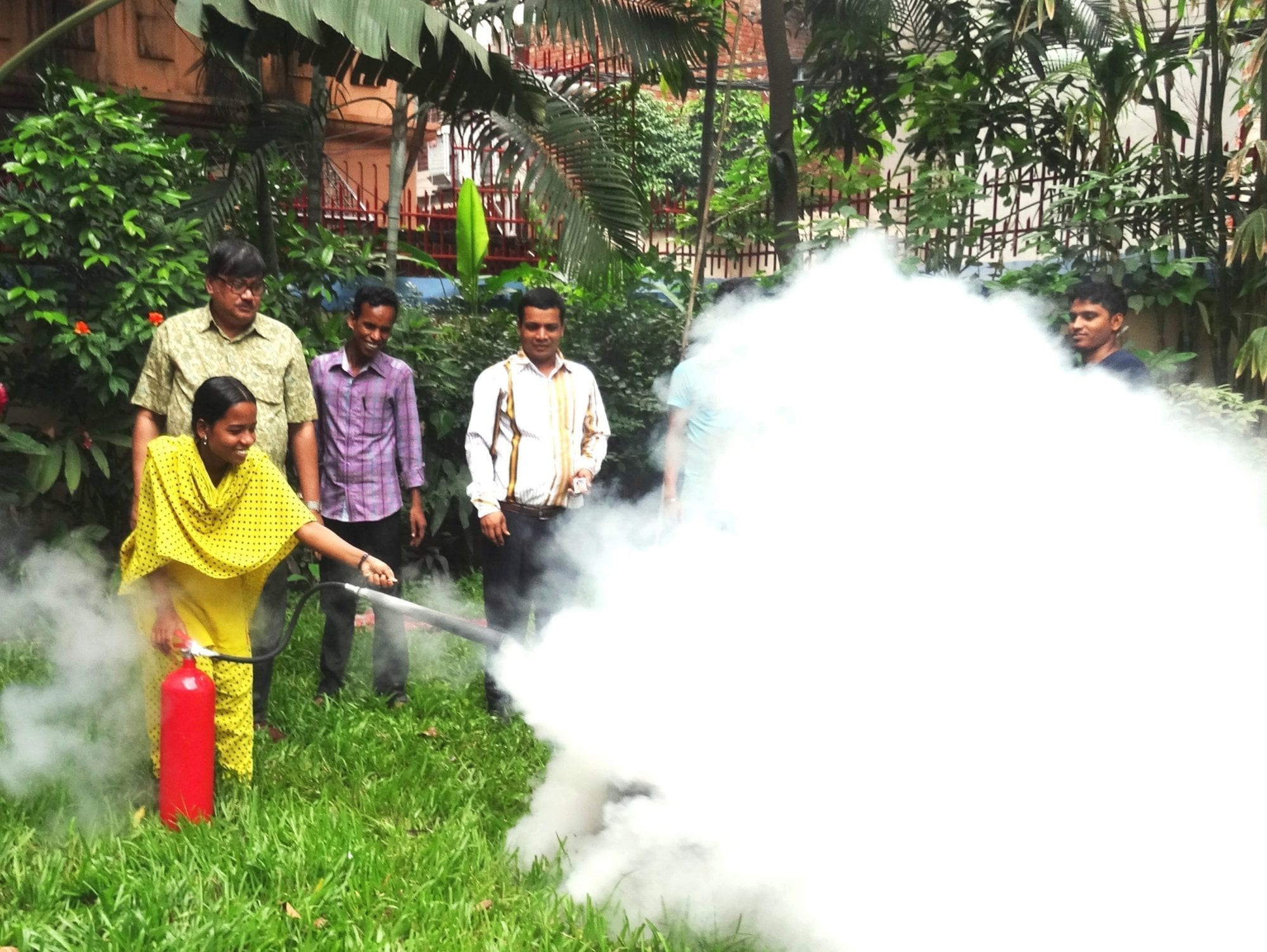
Sep 9, 2014
A garment union leader and her husband were brutally attacked in late August, marking the latest incident of apparent factory-sponsored violence against workers attempting to exercise their right to freedom of association and to just, safe jobs in Bangladesh’s garment factories.
In August 26 as Mira, acting union president at Global Trousers Ltd. in Chittagong, and her husband waited for the bus to take them home after work, several men—armed with iron rods, their faces hidden by handkerchiefs—violently attacked her. She was knocked unconscious following a blow to the head, and her husband, who rushed to help her, also suffered a beating. After the attack, Mira was rushed to a local hospital in critical condition.
The couple report that a low-level manager pointed Mira out to their attackers, and that the men shouted throughout the assault that they would kill the pair unless they resigned from the trade union and left the factory. Days earlier, workers said a group of men with knives were waiting for Mira outside the factory gates, though a change in her routine kept them from carrying out their plan.
In 2011, a new wave of organizing spread across Bangladesh after a long drought when no new independent unions were able to organize. At that time, workers at Global Trousers were among the first to try and organize a trade union—encountering intense resistance from their employer. Although the union met the legal requirements to be registered officially as a trade union, factory management contested its registration, which has since been working its way through the courts. The High Court ruled earlier this year that the case should be transferred to the country’s labor courts but that the union could now legally operate as a trade union inside the factory.
While only three of the original union leaders are left in the factory, union members have continued to persevere under the guidance and leadership of their trade union federation, Bangladesh Independent Garment Workers Union Federation (BIGUF). In the last several months, workers have recruited new members and established a union dues structure through which they are regularly collecting dues from members to continue to build a strong, sustainable organization.
However, management has strengthened its campaign against the union as well. In August, union leaders reported that managers at various levels within the factory told them they would face severe consequences for their activism. On August 22, another union leader reported that men, their faces disguised, dragged her and her husband from their home to attack them but were driven off by people in the community.
The union, with assistance from BIGUF, has filed police reports and sent letters to relevant government officials, the Bangladesh Garment Manufacturers and Exporters Association and other local stakeholders to demand justice for the anti-union acts and for management to respect the union’s legal right to exist. And on September 3, union leaders joined with other BIGUF union members and other labor allies to draw attention to the issue in front of the National Press Club in Dhaka. To date, the perpetrators of the assaults remain at large.

Sep 8, 2014
Garment workers at Chunji Knit Ltd., in Dhaka, Bangladesh, can now freely organize a union, and workers fired for union activity will be reinstated, according to a memorandum of understanding signed by Chunji management and the Bangladesh Federation of Workers Solidarity (BFWS).
The August 21 agreement follows a months-long struggle by workers to be paid the legal minimum wage and freely form a union. Workers protested in February after Chunji did not raise their wages in accordance with the country’s new $67 a month minimum wage for garment workers.
That same month, several union organizers and garment workers were physically attacked and beaten when talking with workers about forming a union. Two workers were hospitalized and some union supporters left the area for their personal safety.
The Wall Street Journal at the time quoted Shahnaz Begum, 25, a four-year Chunji factory worker, who said that factory managers had warned workers not to join the union before the incident in February.
Aug 18, 2014
When 1,300 Bangladeshi garment workers started to organize a trade union at their factory in the Gazipur suburb of Dhaka, the capital, they faced an uphill battle.
However, with assistance from their union federation, the Bangladesh Independent Garment Workers Federation (BIGUF) and the Solidarity Center, and by working to develop a constructive relationship with their employer, Masco Cotton, both sides have been able to sit down and negotiate and resolve issues in the factory. And the dynamics have changed.
“I am very happy that we have established a good relationship with our employer, but it hasn’t been a smooth path,” said Faruk, president of the Masco Cotton Ltd. Workers Union. “At first, I was suspended along with three other workers for trade union activity, and it was two and a half months before we were reinstated.”
Faruk continued, “It took a lot of hard work for us to make the employer understand our problems. The training we received from BIGUF helped a lot. They trained us how to talk to and negotiate with the management.”
Sanjida Akhter, worker and president of Masco Industries Ltd. Workers Unity Union (one of the three union factories affiliated with BIGUF in the five-factory group) said, “Before we formed a union in our factory, (the workers) had no way to communicate with our employer. But now things are different. Management will even approach the union to work out and discuss issues in the factory.”
Through the process of negotiation, workers in the union factories have bargained with their employer to ensure they receive their salaries on time, and to increase attendance and other bonuses as well as night-shift differentials. The unions and management now meet monthly to discuss routine labor disputes and other issues. For example, they met most recently to negotiate leave for the religious holiday Eid and to increase the number of fans on the factory floor.
“Though the workers now have built a much more positive relationship with the employer, initially we had some serious challenges,” said Raju, acting general secretary of BIGUF. He said that despite some workers losing their jobs and one of the union applications being rejected three times before it was registered by the Joint Director of Labor (JDL), they worked hard to demonstrate to the employer that worker empowerment through a trade union could be beneficial for the factory overall if both sides sat down and negotiated.
Mahbubul Alam, executive director of the Masco factory group said, “There is a prevailing negative opinion about trade unions among employers … but it can be beneficial for both the workers and the employer when we work with the unions. If we want to ensure harmony in the factory, we need to maintain a good relationship with workers—and we took this on as a challenge. If we can do it, we can be an example to other RMG (ready-made garment) factories in Bangladesh.”
Mahbubul says that training for both the management and the union can play an important role in developing a constructive relationship and maintaining industrial peace.
“The potential benefit of having a union in the factory is that we hear the voice of all the workers. Management can then understand the workers’ issues and work to solve those problems,” he said.

Jul 11, 2014
Twenty-four garment worker union leaders and organizers in Bangladesh have completed a first-of-its-kind, in-depth training course on fire and building safety, conducted by the Solidarity Center and Selim Newaz Bhuiya, former deputy director of Bangladesh Fire Service and Civil Defense.
The 10-session course aims to equip union leaders with essential knowledge and skills on workplace safety. These workers will now, in turn, educate their co-workers and strengthen their unions’ ability to raise and rectify unsafe factory working conditions.
The training was supported under a grant from the U.S. Department of Labor.
Sanjida, a worker and newly elected woman union leader from Masco Industries Ltd. in Gazipur, said, “I am now a graduate of the fire and building safety course, which makes me very happy. By participating in this training program, I now know how to protect workers from fire and how to identify risks. I learned new skills that will help me to teach other workers and be a stronger union leader.”
In a ceremony concluding the training, 18 factory-level union leaders and six organizers received certificates in recognition of their hard work and new knowledge on workplace safety. These leaders are the first of 14 groups who will eventually complete the course and will go on to help their unions build effective occupational safety and health committees to raise workers’ safety concerns with their employers.
Speaking at the event, attended by U.S. Ambassador Dan Mozena and Bangladesh Labor Secretary Mikail Shiper, Solidarity Center Bangladesh Country Program Director Alonzo Suson said, “Workers around the world have found that, by forming unions and speaking with a collective voice, they are better able to ensure safer working conditions. These new union leaders will be able to take what they’ve learned back to their co-workers to make their factories better, healthier and safer places to work.”
Jul 7, 2014
The Solidarity Center’s Bangladesh Worker Rights Defense Fund has received $11,537 in contributions as of June 30 and donations already have assisted with medical bills for union organizers beaten while talking with garment workers and provided a one-month salary for union leaders assaulted and fired by management.
In February, four union organizers, Hashi, Selim, Ali Hossain and Rita, were badly injured when about two dozen people beat, kicked and threw them to the ground as they were speaking to workers in the dormitory where they live. One of the organizers was taken from the scene, beaten severely and dumped, unconscious, nearby. According to several witnesses, the attack was carried out by Chunjee Garments Ltd. factory managers and other men and women.
Your contributions helped pay medical costs for the organizers, two of whom were hospitalized. Donations also replaced the organizers’ mobile phones, which were taken during the attack.
Defense Fund donations have paid for one month’s salary for several union leaders fired in April, including Nazrul Islam, general secretary of Raaj RMG Washing Plant, who was physically assaulted and terminated by the management. Also, five committee members of the Taratex (BD) Ltd., Workers Union each received a one-month salary after factory management fired them. Without your support, they would have been unable to pay their rent.
These examples are just a few ways the Defense Fund has so far provided crucial support to union organizers, enabling them to continue their efforts to help garment workers gain a voice on the job.
The Solidarity Center launched the Bangladesh Worker Rights Defense Fund in April after an increase in violence against union organizers in seeking to improve the safety in some of Bangladesh’s 5,000 garment factories. Following the Rana Plaza collapse in April 2013, and other high-profile catastrophes, the government showed signs of recognizing worker rights and its own labor laws, allowing workers to form their own unions. As a result, garment workers have registered more than 130 factory-level unions in the past year.
But violence and retaliation in recent months against workers seeking to exercise freedom of association has gone unpunished.
It’s not too late to contribute to the Bangladesh Worker Rights Defense Fund and help the brave women and men who often risk their personal safety to improve the safety of garment workers.
Please donate now.



